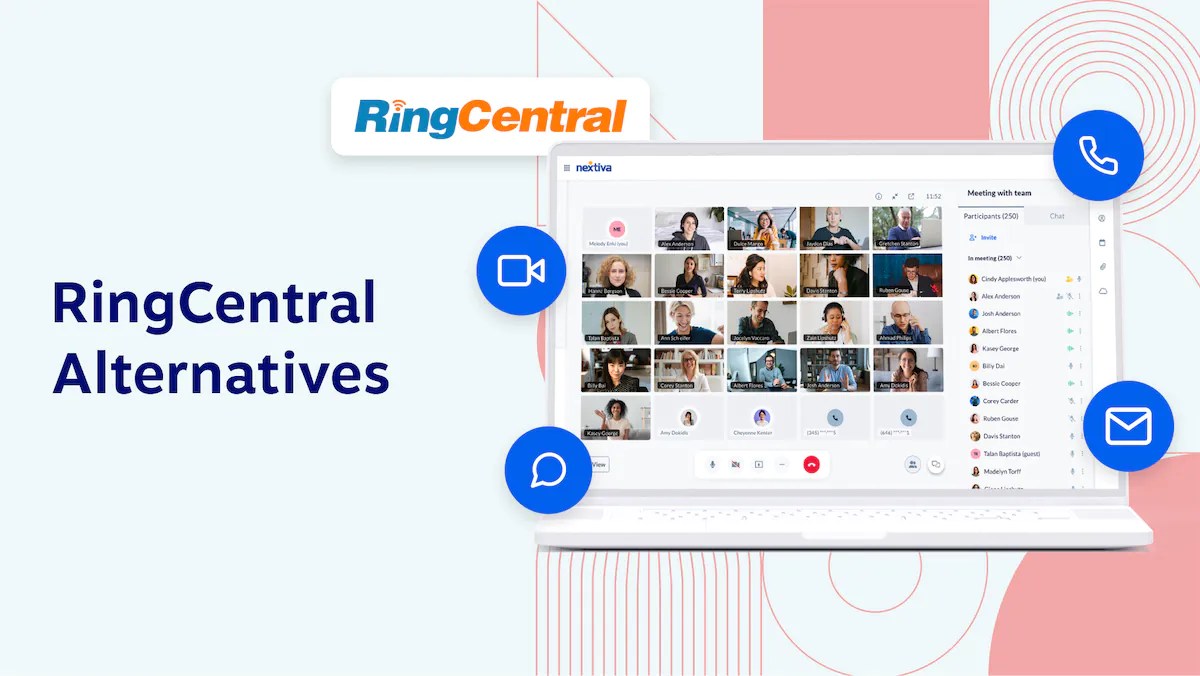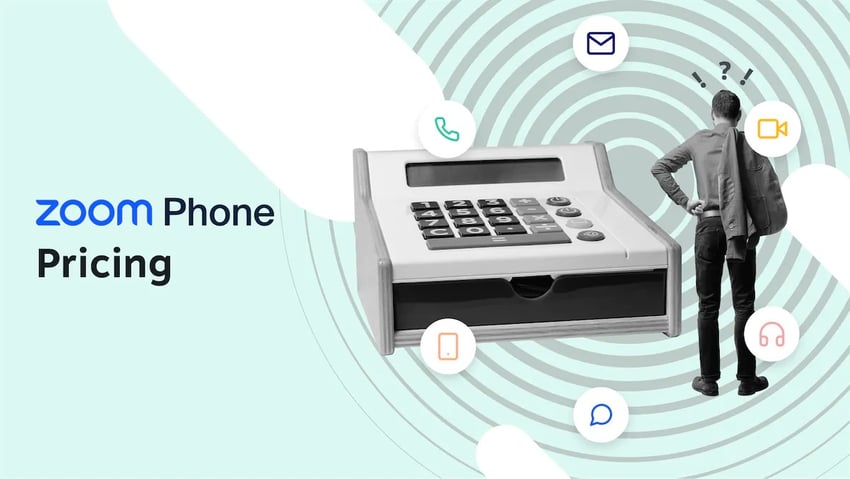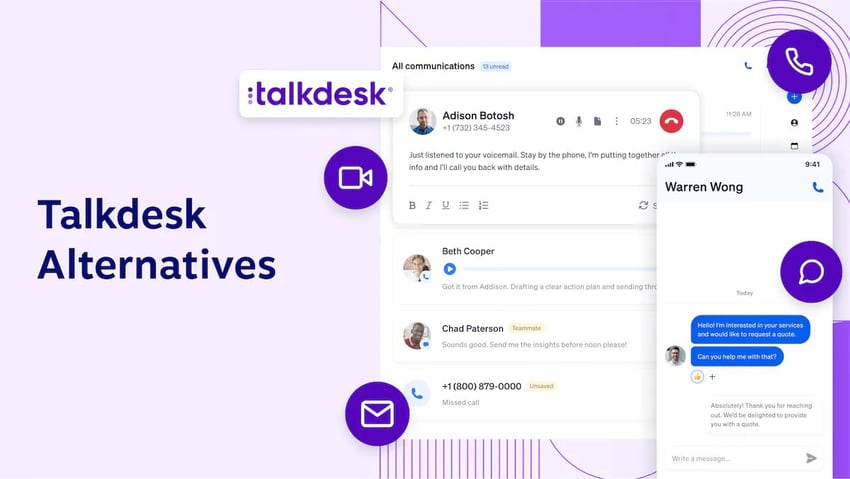RingCentral is a popular business phone service, known for its all-in-one platform for voice, video, and collaboration. But well-known doesn’t always mean right for you. If you’ve ever felt overwhelmed by its complex interface, frustrated by rising costs, or had to wait too long for support requests, you’re not alone.
In this guide, we’ll explain why businesses will be switching from RingCentral in 2026 and review the 10 best alternatives that offer better value, easier setup, and smoother customer service.
Why Businesses Choose RingCentral
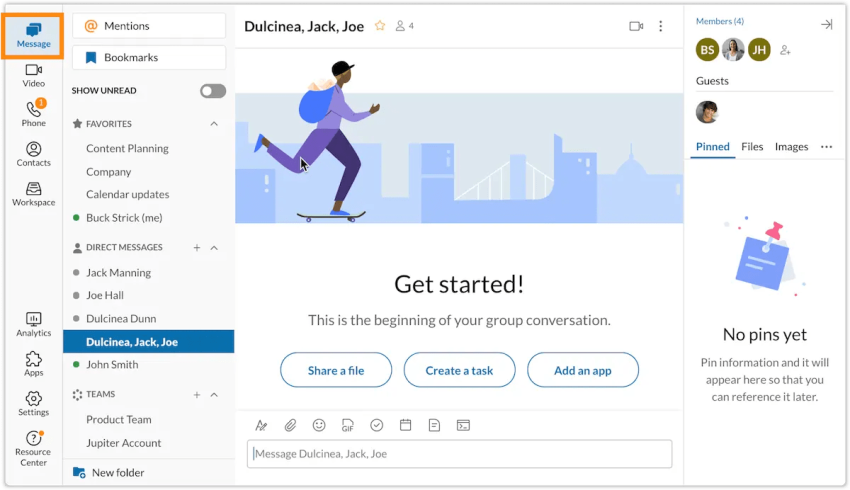
Here’s why businesses opt for RingCentral as their communication platform.
- All-in-one communications: RingCentral bundles VoIP calling, video conferencing, team messaging, and contact center features into a unified platform, centralizing communication workflows.
- Scalability for growth: The platform offers plans that grow with a business, preventing the need to switch providers as needs change.
- Extensive feature set: From unlimited domestic calling and HD video on standard plans to advanced analytics and AI features on higher tiers or add-ons, the unified communications platform covers diverse communication needs.
- Global capabilities: With local numbers available in over 100 countries, local PSTN support in dozens, and multi-language app support, it facilitates international operations.
- Broad integrations: RingCentral connects with many third-party apps, including popular CRMs like Salesforce and productivity suites like Microsoft Teams, to streamline workflows.
Why Businesses Look for RingCentral Alternatives
Even as we enter 2026, RingCentral faces ongoing criticism for being too focused on enterprise customers. Here are the most common complaints from recent reviews:
- High costs and hidden fees: RingCentral’s plans can be more expensive than its competitors, with prices ranging from $30 to $45 per user per month (paid monthly). Many key features, such as toll-free minutes, advanced CRM integrations (e.g., Salesforce requires the Advanced tier), and webinar licenses, come as add-ons. Small businesses may end up paying a premium for enterprise features they don’t use.
- Limited SMS/MMS plans: The platform has monthly SMS message limits per user (only 25 per user on the Core plan). Exceeding these limits incurs additional charges, and the collaboration features for shared SMS lines aren’t as intuitive as some alternatives.
- Complex user experience: RingCentral’s user interface can be somewhat complicated to navigate, especially for administrators. Many users report a steep learning curve and a clunky setup process.
- Reliability and support issues: RingCentral has experienced significant outages in the past, and its reliance on only two data centers can lead to latency issues. The platform’s customer support also faces heat for long wait times and slow problem resolution. One user described their experience as a “multi-week saga” just to port their numbers.

Summary of the Best RingCentral Alternatives
- Nextiva: Best overall choice. Ideal for businesses of all sizes needing reliability, 24/7 support, and a unified customer experience platform.
- Quo (formerly OpenPhone): Best for startups and modern teams. Offers a sleek interface, shared inboxes, and strong business texting capabilities.
- Dialpad: Best for AI enthusiasts. Strong choice for teams that want real-time transcription and sentiment analysis built into every call.
- Ooma: Best budget-friendly choice. Perfect for small businesses needing essential VoIP features without complex setups.
- Aircall: Best for sales and support teams. A powerhouse for those who live in Salesforce or HubSpot and need a high-volume power dialer.
- Zoom Phone: Best for Zoom users. The logical choice if you want to consolidate your video meetings and phone system into one bill.
- 8×8: Best for global enterprises. Excels with unmetered international calling plans and integrated contact center features.
- Vonage: Best for customization. Ideal for businesses that need a flexible platform or programmable voice APIs to build custom workflows.
- Grasshopper: Best for solopreneurs. A simple virtual number overlay for those who just need to separate business calls on their personal phone.
- Microsoft Teams Phone: Best for Microsoft 365 users. Great for teams that want to manage calls directly within the Teams interface they use daily.
2026 Comparison: 10 Top RingCentral Alternatives at a Glance
For those looking for a quick overview, this table provides a high-level comparison of our top picks.
| Provider | Starting price | Best for | Standout feature |
| Nextiva | $15/mo | Affordable calling plans & excellent customer support | Unified CX & 24/7 customer support |
| Zoom Phone | $10/mo | Video-first teams | Zoom Workplace integration |
| 8×8 | $24/mo | Global teams | Unlimited international calling to 14+ countries |
| Aircall | $30/mo | Sales and support | Power Dialer & Salesforce deep-sync |
| Dialpad | $15/mo | AI-powered workflows | Real-time AI coaching & transcription |
| Vonage | $13.99/mo | API customization | Built-in app center and developer APIs |
| MS Teams Phone | $10/mo* | Microsoft users | Direct routing into your existing Teams app |
| Quo (formerly OpenPhone) | $15/mo | Startups | Shared inbox & simple texting |
| Ooma | $19.95/mo | Budget small businesses | Easy plug-and-play desk phone setup |
| GoTo Connect | $26/mo | Visual routing | Intuitive drag-and-drop call flow editor |
(Note: Pricing is based on annual billing and may vary. 8×8 pricing requires contact with sales. MS Teams Phone requires an M365 base license and a separate plan.)
1. Nextiva: Best Overall RingCentral Alternative
Best for: Growing teams that want enterprise features without the enterprise price tag.
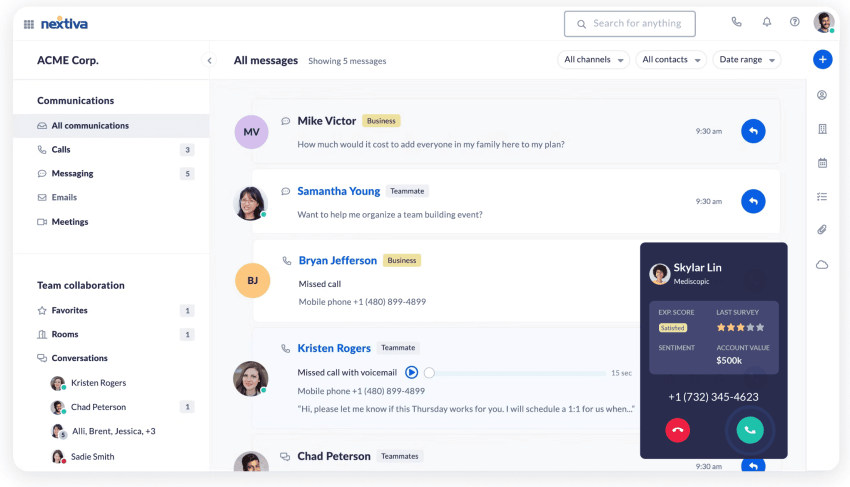
Nextiva is a powerful, well-rounded business communications platform that offers a unified solution for VoIP, video conferencing, team messaging, and customer experience management. It’s a direct and user-friendly alternative to complex and expensive platforms like RingCentral.
Known for its excellent customer service and reliability, it’s the first choice for businesses of all sizes. While RingCentral can sometimes seem disjointed, Nextiva combines everything in a clear user interface called UCXM (Unified CXM), is highly reliable, and offers an award-winning customer service.
Key features
Here are some of Nextiva’s key features:
- Unified customer experience management: An AI-powered platform that unifies customer interactions across all channels into a single hub.
- Exceptional reliability: A 99.999% uptime, backed by eight redundant data centers, minimizes downtime and ensures uninterrupted communication.
- Advanced business integrations: Connects with leading CRM software like Salesforce, HubSpot, and Microsoft Dynamics.
- Friendly 24/7 customer support: Responsive, knowledgeable, and helpful support that keeps your business connected.
Why Nextiva is a top RingCentral alternative
RingCentral users can struggle with long support wait times and frustrating number porting issues. Nextiva addresses these problems directly with responsive, 24/7 internal support and industry-leading 99.999% availability. This reliability is ensured by eight redundant data centers in North America, giving Nextiva a competitive advantage over competitors with fewer locations.
Nextiva pricing
Nextiva offers transparent pricing designed to scale from small teams up to large enterprises:
| Plan | Annual price (per user/month) | Key feature set & ideal user |
| Core | $15 | Essential VoIP: Inbound/outbound calling, business SMS, video meetings, and team chat. Perfect for startups and small teams with basic needs. |
| Engage | $25 | Growing teams: Adds customer-to-team SMS, a toll-free number with minutes, advanced reporting, and live/bot web chat. |
| Power Suite CX | $75 | CX-focused teams: Adds blended omnichannel engagement, real-time dashboards, AI transcription and summarization, and advanced intelligent routing. |
Pros and cons
Pros: Lower entry-level pricing than RingCentral, best-in-class customer support (consistently rated much higher than RingCentral), superior reliability (99.999% uptime), and a user-friendly interface.
Cons: Some advanced analytics and call center features require the top-tier plans.

Who is Nextiva best for?
Businesses that need a reliable, feature-rich unified communications platform with outstanding customer support. It’s a great RingCentral alternative for small businesses that need an entry-level plan with essential business calling features at an affordable price.
What users say about Nextiva
“No more robo calls, great auto attendants, lots of extra features, Customer support is 24/7, easy to use, and I use it all the time. Nextiva keeps all of my calls from 12 different numbers well organized. They have it set up where I see the caller’s ID, and also see from which auto attendant they are calling. This is vital.” — Robert H. via G2

2. Vonage: Best for Customization and APIs
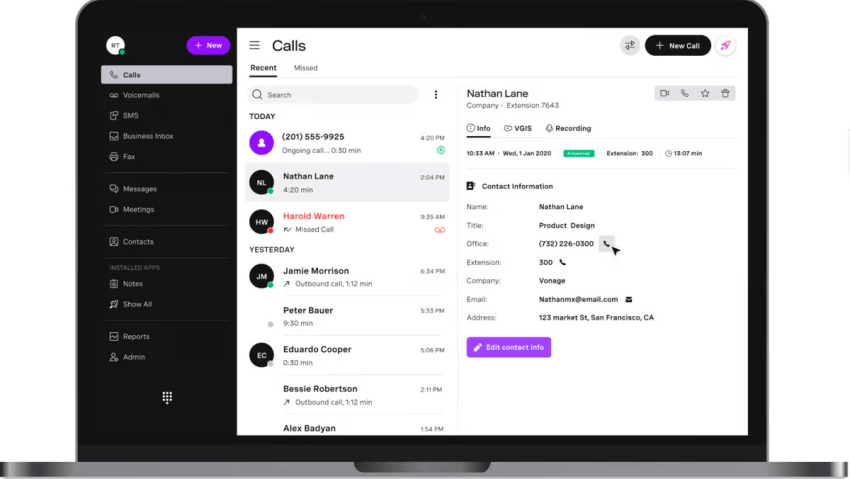
Vonage is the ideal choice for businesses looking to create customized communication workflows. Its extensive APIs allow you to connect your VoIP phone system with various native and third-party applications.
Key features
Here are some top features of Vonage:
- Unlimited domestic calling: Make unlimited calls to any number in the United States.
- VBC Admin Portal: Use an intuitive portal for managing users, phones, and settings.
- Extensive app center: Get a wide selection of integrations to enrich your communication capabilities.
Vonage pricing
Vonage offers metered and unlimited international calling plans, along with add-ons like toll-free numbers and virtual fax.
- Mobile: $13.99/line/month. Includes unlimited calls, SMS, and team messaging.
- Premium: $20.99/line/month. Everything in Mobile, plus unlimited video meetings for up to 200 participants and access to the VBC App Center.
- Advanced: $27.99/line/month. Adds on-demand call recording, visual voicemail, and call groups.
Pros and cons
Pros: High degree of customization, good feature set, good call quality.
Cons: Some features require higher tiers, mixed support reviews.
Who is Vonage best for?
Businesses that need deep integrations or custom communication solutions.
What users say about Vonage
“My experience with Vonage was good because their app is user-friendly and visually appealing. It was simple to use and didn’t require any training from what I recall.” — Olivia D. via G2
3. Ooma: Best budget-friendly option
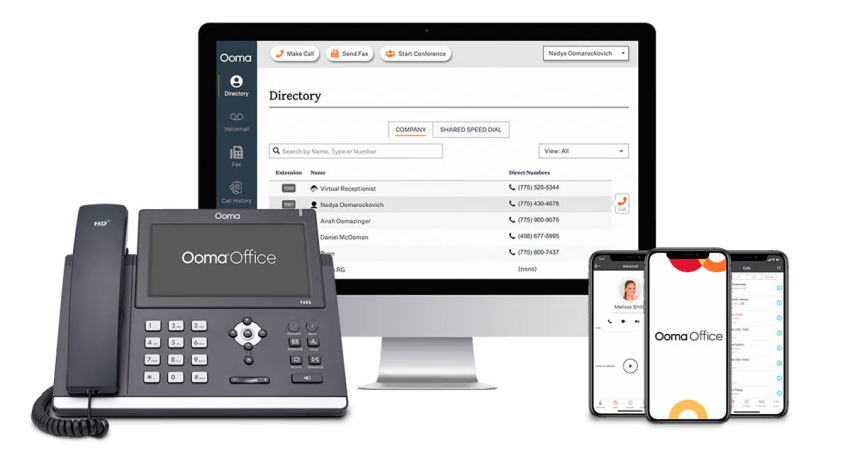
Ooma is a cost-effective VoIP solution for small businesses. It offers all the essential features to get started, including call forwarding, a virtual receptionist, and CRM integrations.
Key features
Here are some top Ooma features:
- Call queuing: Automatically places calls on hold and routes them to the next available agent.
- Salesforce integration: Make and receive calls directly within Salesforce.
- Hot desking: Allows employees to use any unassigned phone as their own.
Ooma pricing
Ooma offers three business phone plans.
- Ooma Office Essentials: $19.95/user/month. Includes virtual receptionist, extension dialing, music on hold, ring groups, and a mobile app.
- Ooma Office Pro: $24.95/user/month. Everything in Essentials, plus call recording, text messaging, video conferencing, and a desktop app.
- Ooma Office Pro Plus: $29.95/user/month. Adds a call center, hot desking, team chat, call queuing, voicemail transcription, and CRM integrations.
Pros and cons
Pros: Budget-friendly, easy setup, includes core features.
Cons: Limited integrations, unlimited calling requires the Pro Plus plan.
Who is Ooma best for?
Small businesses looking for reliable, affordable phone service without extensive features.
What users say about Ooma
“Ooma makes it easy for me to manage calls coming into my business. The system allows for me to have an automatic answering service that routes calls appropriately and reduces the need for me to answer inappropriate or unnecessary callers.” — Jenay A. via G2
4. Aircall: Best for sales and support teams
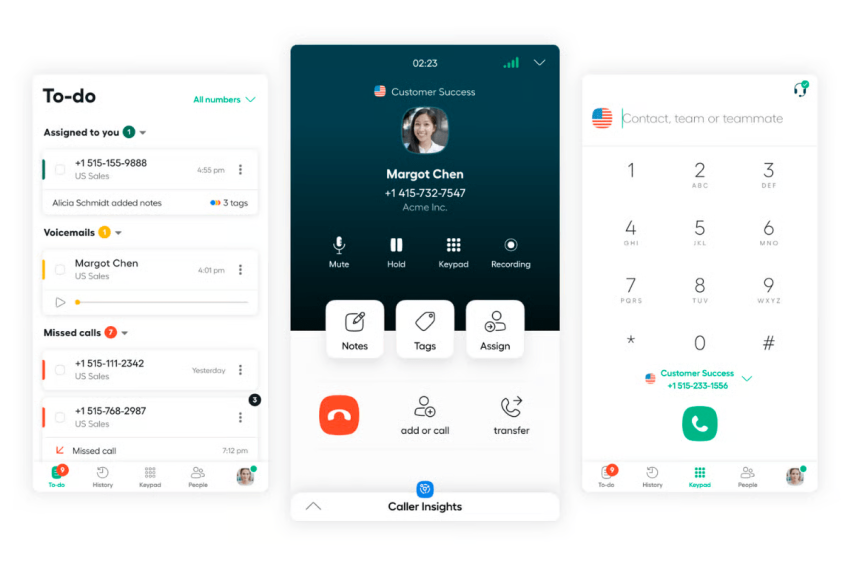
Aircall is a cloud-based call center software for small and medium-sized businesses. It offers powerful analytics and integrates well with CRM systems like HubSpot, letting you place calls directly from your CRM system.
Key features
Aircall’s key features include:
- Power dialer and voicemail drop: Automate dialing and instantly send pre-recorded voicemails.
- Advanced analytics and call monitoring: In-depth call metrics and live monitoring to enhance performance.
- Conversation intelligence with Aircall AI: Analyze call transcripts, generate summaries, and identify customer sentiment.
Aircall pricing
Aircall offers two main plans with a three-user minimum, plus a custom option. Annual billing provides a discount.
- Essentials: $30/user/month. Includes IVR, call recording, basic integrations, and unlimited inbound and internal calls (excluding toll-free).
- Professional: $50/user/month. Everything in Essentials, plus a power dialer, Salesforce integration, voicemail drop, and advanced analytics.
- Custom: Quote-based (requires a minimum of 25 licenses). Adds API support, unlimited international calls, and full analytics.
Aircall charges an additional $9/license/month for AI-powered features and $15/user/month for advanced analytics.
Pros and cons
Pros: Strong focus on call center workflows, excellent CRM integration, insightful analytics.
Cons: Minimum user requirement, can be pricey for smaller teams.
Who is Aircall best for?
Sales teams, support centers, and businesses focused on CRM integration for calling.
What users say about Aircall
“I particularly appreciate the ease of use and intuitive interface of Aircall. The seamless integration with tools like Salesforce and Zendesk really saves time on a daily basis. Call tracking, real-time statistics, and collaborative call management make teamwork easier and improve productivity.” — Rodrigue L. via G2
5. Dialpad: Best for AI-Powered Insights
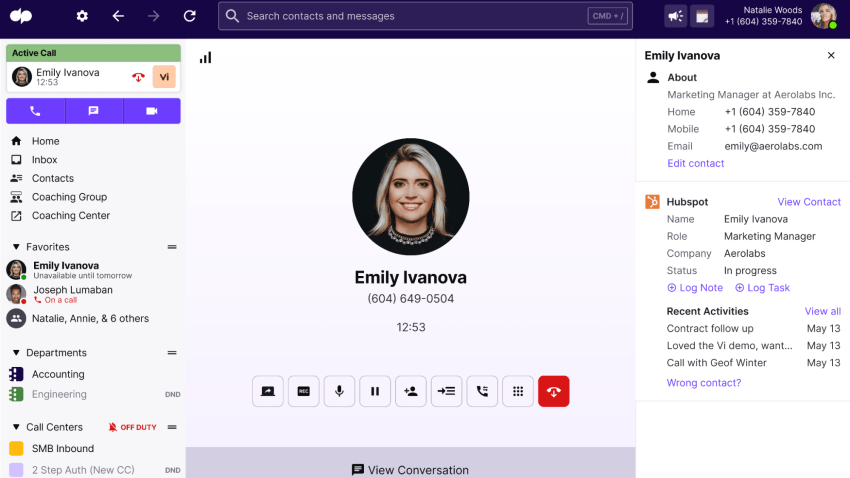
Dialpad is an AI-powered contact center solution that offers real-time transcriptions, sentiment analysis, and other intelligent features. Its modern interface and user-friendly design make it a popular business phone system.
Key features
- AI-powered call & voicemail transcriptions: Automatically transcribe calls and voicemails for easy review.
- Google Workspace & Microsoft 365 integrations: Easily manage your contacts, calendar, and other data.
- Real-time analytics & reporting: Track your call performance with real-time analytics.
Dialpad’s pricing
Dialpad offers two main plans:
- Standard: $15/user/month. Includes unlimited calls, AI-powered meetings, and built-in messaging.
- Pro: $25/user/month. Everything in Standard, plus key CRM integrations and 24/7 customer support.
- Enterprise: Quote-based. Adds advanced enterprise-level features and support.
Dialpad‘s AI features, such as real-time transcription and sentiment analysis, may incur additional costs.
Pros and cons
Pros: Innovative AI features, modern interface, competitive pricing.
Cons: Some AI features may have limits or additional costs, and restrictive video meeting participant limits on lower tiers.
Who is Dialpad best for?
Businesses that need AI-driven insights, real-time transcriptions, and a modern user experience.
What users say about Dialpad
“Dialpad Connect’s AI-powered voice intelligence, with real-time transcription and sentiment analysis, streamlines communication and boosts productivity. Its seamless integrations with tools like Salesforce and Google Workspace make it a versatile choice for businesses.” — Hassan A. via G2
6. Grasshopper: Best for Solopreneurs and Small Teams
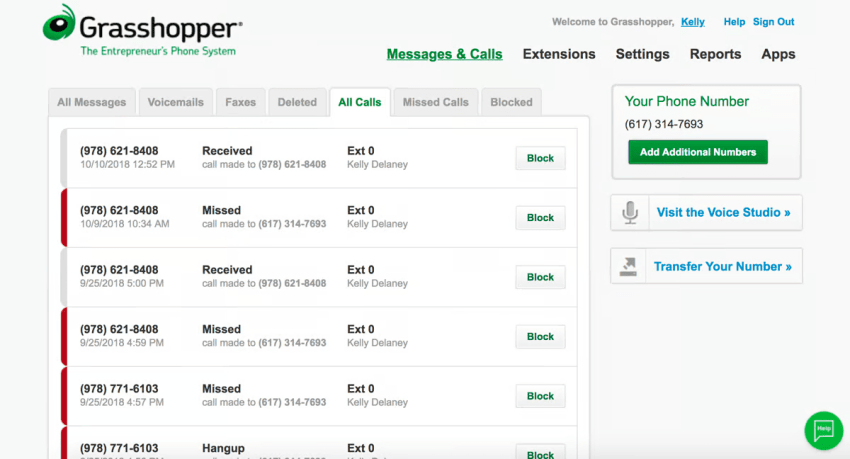
Grasshopper is a virtual phone system for solopreneurs and small businesses that need a simple, professional phone presence. It’s known for its ease of use and affordability.
Key features
Grasshopper’s key features include:
- Call forwarding: Route business calls to your personal phone.
- Virtual fax: Receive faxes as PDF attachments in your email.
- Custom greetings: Record professional greetings for your business.
Grasshopper pricing
Grasshopper offers three plans with a 10% discount for annual billing.
- True Solo: $14/month. Includes 1 user, 1 phone number, and 1 extension.
- Solo Plus: $25/month. Includes unlimited users, 1 phone number, and 3 extensions.
- Small Business: $55/month. Adds unlimited users, 4 phone numbers, and unlimited extensions.
Pros and cons
Pros: Affordable, simple setup, great for separating business and personal calls.
Cons: Lacks video conferencing and team messaging, not a full VoIP replacement.
Who is Grasshopper best for?
Solopreneurs, freelancers, and micro-businesses that need a basic virtual number and call forwarding capabilities.
What users say about Grasshopper
“Grasshopper was very user-friendly. It was easy to use, and we never really had a need to contact customer support. The implementation was easy, and we loved that we could use it on a line/VOIP or also log into the Grasshopper app and answer on the go.” — Alex R. via G2
7. Zoom Phone: Best for Integrated Voice and Video
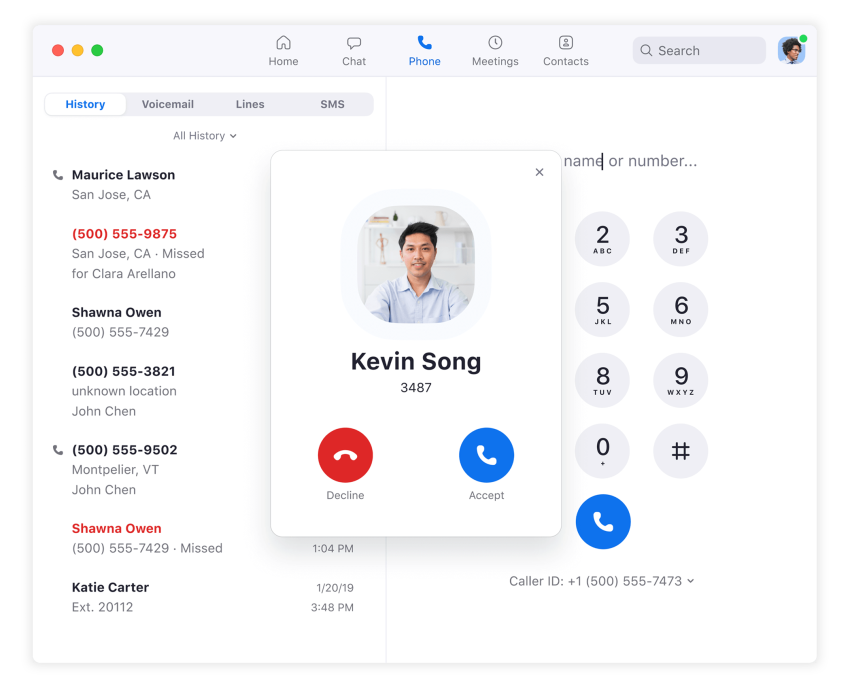
Zoom Phone extends the popular Zoom video conferencing platform into a full-fledged business phone system. It’s an excellent choice for companies that have already invested in the Zoom ecosystem.
Key features
Here are some of Zoom Phone’s standout features:
- Meeting elevation: Convert a phone call to a Zoom video meeting with one click.
- Centralized administration: Manage phone, video, and messaging from a single dashboard.
- Intelligent call routing: Configure custom call flows with auto-attendants and call queues.
Zoom Phone pricing
Zoom Phone offers standalone plans and bundles with Zoom Workplace.
- US & Canada Metered: $10/user/month. Includes metered outbound calling.
- Regional Unlimited: $15/user/month. Includes unlimited domestic calling in the US and Canada.
- Global Select: $20/user/month. Adds unlimited domestic calling in one of 48 select countries.
Some popular Zoom Phone add-ons include international calling starting at $10/month and toll-free numbers starting at $5/month.
Pros and cons
Pros: Seamless integration with Zoom Meetings, intuitive interface, excellent mobile app.
Cons: Requires a base Zoom license, fewer advanced call center features.
Who is Zoom Phone best for?
Businesses invested in the Zoom ecosystem that want unified communications and video integration.
What users say about Zoom Phone
“Zoom Phone is a cloud telecom service, which comes with a fixed-line telecom caller ID. It acts like our regular phone but comes with lots of features like Call recording, Call History, Voicemail capabilities, which can be used with Priortize voicemail using AI using topics. Zoom Phone is very handy in day-to-day activities, which comes bundled with Zoom Workplace.” — Hemang T. via G2
8. Quo (formerly OpenPhone): Best for Startups and Small Teams
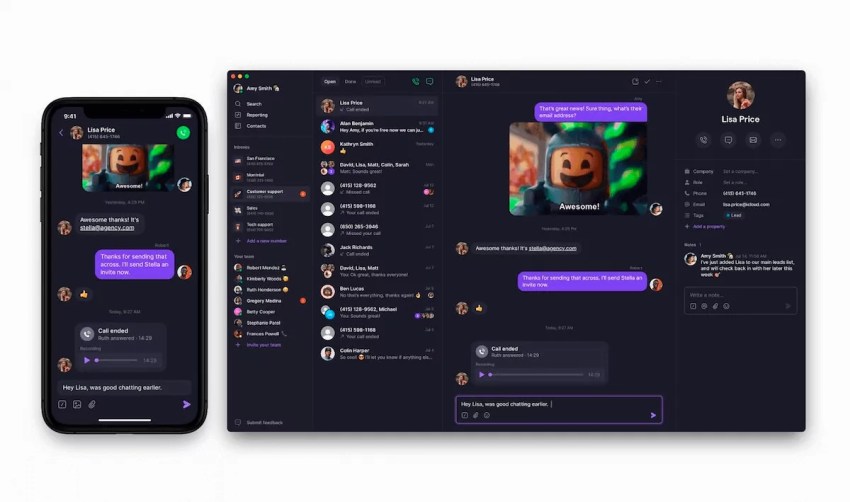
Quo is a modern, mobile business phone system for startups and small teams. It’s ideal for collaborative texting and calling.
Key features
OpenPhone’s key features include:
- Advanced texting: Unlimited SMS/MMS with team collaboration features.
- Auto-replies and snippets: Create message templates and automated responses.
- Zapier and Slack integrations: Connect your phone system with your other tools.
Quo pricing
Quo offers three main plans:
- Starter: $15/user/month. Includes one phone number per user, voicemail transcription, and call recording.
- Business: $23/user/month. Everything in Starter, plus HubSpot integration, call transfer, and phone menus.
- Scale: $35/user/month. Adds priority support and advanced analytics.
Pros and cons
Pros: Exceptional user experience, superior business texting, affordable pricing.
Cons: Limited video conferencing, fewer integrations than enterprise solutions.
Who is OpenPhone best for?
Startups, small businesses, and entrepreneurs that need modern design, team collaboration on calls/texts, and simple pricing.
What users say about OpenPhone
“I’ve been using OpenPhone for my web agency and love how seamlessly it integrates with my personal mobile. There’s no need for a second phone. It’s affordable, handles SMS well, and works great if you don’t rely heavily on calls.” — Nat C. via G2
9. 8×8: Best for Contact Center and International Calling
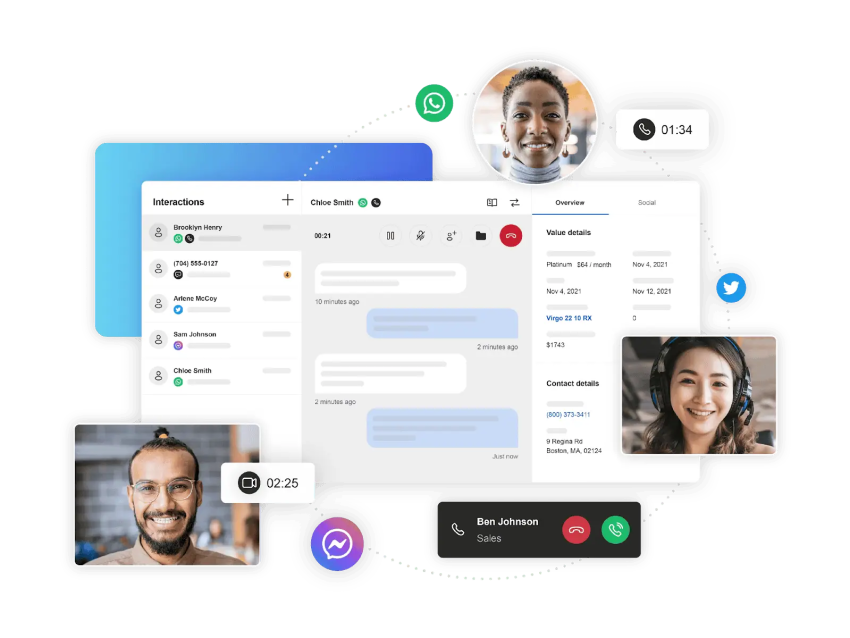
8×8 offers a robust cloud communications platform that combines unified communications (UCaaS) and contact center (CCaaS) capabilities, making it an excellent choice for global enterprises.
Key features
Here are some of 8×8’s notable features:
- Integrated contact center: Advanced call routing, IVR, and omnichannel support.
- Global reach: Local phone numbers in over 130 countries.
- Compliance certifications: HIPAA, GDPR, and SOC 2 compliant.
8×8 pricing
8×8’s pricing is primarily quote-based, but they offer some starting points for their plans.
- X2 Edition: $25/user/month. Includes unlimited calling to 14 countries, business SMS, and basic integrations.
- X5 Edition: $35/user/month. Includes unlimited calling to 32 countries and call recording.
- X8 Edition: $55/user/month. Adds advanced features and analytics.
Pros and cons
Pros: Exceptional international coverage, integrated contact center, strong compliance.
Cons: Can have a dated interface, a higher learning curve.
Who is 8×8 best for?
Mid-sized to large businesses with global operations, integrated contact centers, and regulated businesses requiring strong compliance features.
What users say about 8×8
“I appreciate 8×8’s cross-platform accessibility—on desktop, it runs smoothly via web browser, while on mobile, it offers a dedicated app for reliable, on-the-go communication.” — Efrain S. via G2
10. Microsoft Teams Phone: Best for Microsoft 365 Environments
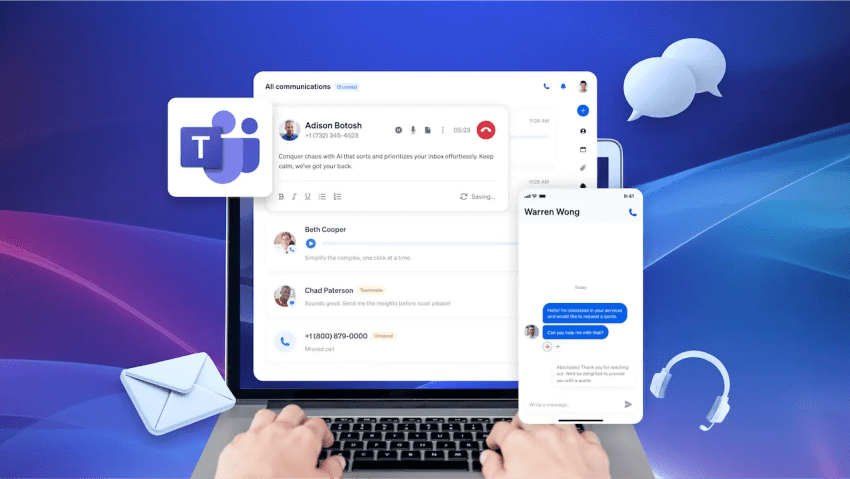
Microsoft Teams Phone integrates a business phone system directly into the Microsoft Teams platform. It’s the ideal choice for companies invested in the Microsoft 365 ecosystem.
Key features
Microsoft Teams Phone’s key features include:
- Native Microsoft 365 integration: Smooth connection with Outlook, OneDrive, and SharePoint.
- Familiar interface: Phone functionality within the familiar Teams environment.
- Advanced call controls: Call delegation, auto-attendants, and call queues.
Microsoft Teams Phone pricing
Microsoft Teams Phone requires a Microsoft 365 business subscription (which starts at around $6/user/month) in addition to the phone system add-on.
- Teams Phone Standard: $10/user/month. Includes basic phone system features.
- Pay-as-you-go: $13/user/month. Includes metered outbound calling.
- Calling Plan: $17/user/month. Includes 3,000 domestic outbound minutes.
- Domestic and International Calling: $34/user/month. Adds 3,000 domestic or 600 international outbound minutes.
Pros and cons
Pros: Deep integration with Microsoft 365, consolidated vendor management, strong security.
Cons: Requires a Microsoft 365 subscription, higher total cost, less specialized than dedicated VoIP providers.
Who is Microsoft Teams Phone best for?
Businesses already committed to the Microsoft ecosystem that want to consolidate vendors and integrate phone systems with their existing collaborative workflows.
What users say about Microsoft Teams Phone
“I like that it brings everything into one place, like calling, messaging, sharing files, and team communication. It saves time because I don’t have to switch between different apps. It also works smoothly with Outlook and other Microsoft tools. Communication is easy, and I can use @mentions to quickly reach someone when needed.” — Sadanala J. via G2
How We Evaluated and Picked the Top RingCentral Competitors
To provide you with the most reliable and practical recommendations, we used a clear methodology and analyzed more than 15 leading VoIP providers. Our process included:
- Real-world testing: Used free trials and demos to see each platform’s user interface, ease of setup, and user experience.
- Customer review analysis: Analyzed real user reviews on trusted sites like G2 and Capterra, focusing on recurring themes like reliability, customer support, and hidden costs.
- Pricing and feature testing: Carefully compared each provider’s pricing tiers, add-on costs, and features to establish true value and uncover any limitations of entry-level plans.
- Reliability testing: Checked each provider’s advertised availability, service level agreements (SLAs), and data center infrastructure to ensure our recommendations are based on reliability.
This process made sure our list reflects solutions that solve the most pressing problems RingCentral users experience.
Features To Look for in a RingCentral Alternative
When considering RingCentral’s competitors, businesses shouldn’t just focus on cost. They should also consider which channels and features these solutions support for daily workflows and long-term growth. The following features should be a priority:
- Unified messaging: Opt for platforms that combine phone, video, SMS/MMS, and team chat under one roof. Navigating between individual apps consumes time, so look for tools that allow you to switch between phone, video, or chat without missing a beat.
- User-friendly interface: Simplicity and an intuitive layout make it easy to implement and use on an ongoing basis, which is crucial whether your team is tech-savvy or not.
- File and screen sharing: For both remote teams and client presentations, integrated file sharing and quick-start screen sharing are essential.
- Flexible integration: Look for compatibility with common tools your team already uses — Salesforce, Slack, Microsoft Teams, or Google Workspace. CRM integrations reduce back-and-forth switching and manual data entry, allowing everyone to focus on more important tasks.
- Call handling and management: Features like call forwarding, voicemail transcription, call recording, and analytics affect how your team carries out internal and external conversations. Bonus points go to platforms with advanced call monitoring and CRM integration.
- Mobile and desktop apps: The best platforms support full device functionality and keep you connected, whether you’re at your desk or on the go.
- Reliable support and security: Fast, helpful customer service and strong security can make a difference to your experience, especially during outages or technical issues.
It’s important to prioritize communication platforms whose features directly align with your team’s current communication needs — and with the areas you want to develop further. Consider your daily mix: phone calls, video conferences, group chats, and customer messages. The better a provider’s offering fits your daily routine (without requiring expensive add-on features), the more valuable it is.
How To Choose an Alternative to RingCentral
Switching from or choosing an alternative to RingCentral means keeping a pulse on the following key factors:
- Identify your must-have features: List the essential communication tools your team needs daily. Is it primarily voice, or are video meetings, team chat, and SMS equally important? Do you need advanced call routing, analytics, or specific integrations (e.g., Salesforce, Microsoft 365)?
- Budget for the features: Determine what you are willing to spend per user, per month. Compare the total cost of ownership, factoring in any one-time setup fees, hardware costs, or charges for extra minutes and numbers.
- Prioritize ease of use: A complex system hinders adoption and productivity. Look for intuitive interfaces and simple management. A free trial or demo is the best way to test this.
- Scrutinize customer support: When issues arise, prompt and effective support is key. Check recent reviews for feedback on support quality, responsiveness, and availability (e.g., 24/7, phone, chat).
- Plan for future growth: Will the provider grow with you? Ensure the platform can easily accommodate new users, locations, and feature needs as your business expands.
- Check for reliability and uptime: Look for providers with a transparent, financially-backed Service Level Agreement (SLA) and a public status page. An uptime of 99.99% or higher is the industry standard.
Which RingCentral Alternative Is Right for You?
With so many great options, the best choice comes down to your top priority.
- If you prioritize reliability and outstanding customer support, Nextiva offers 99.999% superior uptime and consistently high ratings for customer service, providing peace of mind.
- If you’re a startup or small team that collaborates over text, OpenPhone is a great choice. Its shared inbox for calls and messages is designed for team collaboration and has an exceptionally user-friendly interface.
- If you want advanced AI features for coaching and automation, Dialpad offers real-time transcription, sentiment analysis, and AI-driven insights to improve team productivity.
- If you need the most affordable, no-frills solution, Ooma delivers reliable, essential phone service at a budget-friendly price point, making it perfect for small businesses with basic needs.
- If you run a dedicated sales or support team that lives in a CRM, Aircall is built for you. Its deep integrations with platforms like Salesforce and HubSpot, combined with call center analytics, optimize sales and support workflows.
- If you’re standardized on Microsoft 365, Microsoft Teams Phone is the logical choice. It integrates with the tools your team already uses daily, consolidating vendors and simplifying workflows.
Nextiva vs. RingCentral: Why Choose Nextiva?
Looking for a better communication solution without RingCentral’s drawbacks? A VoIP comparison survey by GetVoIP found that Nextiva is the best-rated VoIP phone service when compared with alternatives, including RingCentral. Nextiva delivers the perfect combination of affordability, ease, reliability, and support that makes switching worthwhile.
| Feature | Nextiva | RingCentral | The difference |
| Starting price | $15/user/mo | $20/user/mo | Nextiva is a around 25% more affordable annually. |
| Reliability | 99.999% uptime | 99.99% uptime | Nextiva’s 8 data centers offer slightly higher redundancy than RingCentral. |
| Quality of Support (G2) | 9.0 (2700+ reviews) | 8.0 (900+ reviews) | Both offer 24/7 support, but Nextiva scores more for its quality of support. |
| Call recording | Included (Engage tier) | On-Demand / Automatic | RingCentral creates a distinction between on-demand and auto recording tiers. |
| Integrations | Salesforce/HubSpot | Salesforce/HubSpot | Tie. Both offer robust ecosystems, though Nextiva’s setup is rated as simpler. |
✅ Better value
Get enterprise-grade features without the premium price tag. Nextiva offers comparable capabilities at lower costs — ideal for businesses seeking quality without overpaying.
✅ Simple experience
Intuitive design means even complex tasks like call routing become straightforward, with no technical headaches.
✅ Friendly support
Nextiva’s stellar customer support rating means real help when you need it. Nextiva offers responsive, knowledgeable support with minimal wait times.
✅ High reliability
With eight North American data centers (vs. RingCentral’s two), Nextiva delivers 99.999% uptime, averaging just six minutes of downtime yearly compared to RingCentral users’ reported 43 minutes of downtime in 2023.
✅ Customer experience focus
Nextiva’s Call Pop shows agents crucial customer data before conversations begin, while advanced analytics drive smarter decisions that improve customer satisfaction. Nextiva consistently performs where it matters most.

Reliable phone service you won’t have to worry about.
RingCentral letting you down? Get enterprise-grade reliability backed by 24/7 award-winning support.
RingCentral Alternatives FAQs
You probably have a solid foundation for the best RingCentral alternatives. Let’s wrap this up with a few key insights to help you choose a particular alternative.
Nextiva tops RingCentral’s best alternatives list, especially for small businesses. It balances features, affordability, and exceptional customer support. Its unified communications platform combines various communication needs into one.
If your team lives in Salesforce, Nextiva and Aircall are your top choices.
Nextiva offers a deep two-way sync that logs calls, notes, and recordings automatically, plus call pop to show customer details instantly.
Aircall provides a power dialer directly inside the Salesforce dashboard, perfect for high-velocity sales teams.
Note: RingCentral offers this too, but locks it behind pricier Advanced or Ultra tiers.
According to user reviews on G2 and Capterra, the most frequent frustrations are:
Support wait times: Slow response times for technical issues or billing disputes.
Porting delays: Moving numbers away from the platform can sometimes be a lengthy process.
Hidden fees: Features like toll-free minutes or SMS often have lower caps than expected, leading to overage charges.
For micro-teams (1-2 users), Ooma or OpenPhone are the most affordable starting points. For growing small businesses (5+ users) that need professional features like IVR and recording, Nextiva’s Core plan ($15/mo) offers the best price-to-value ratio compared to RingCentral’s base plan ($20/mo).
Best overall: Nextiva. Its mobile app mirrors the desktop experience perfectly, allowing staff to flip live calls from laptop to cell without hanging up.
Best for async work: Quo. Its shared inbox allows distributed teams to cover a single support number via text and voice effortlessly.
Moving is standardized and safe if you follow these steps:
Don’t cancel prematurely: Keep your RingCentral account active so you don’t lose your numbers.
Get your CSR: Download a Customer Service Record from the RingCentral portal to prove ownership.
Unlock your PIN: Go to Phone System > Number Porting in your RingCentral admin portal to locate your Transfer PIN.
Submit the LOA: Give your new provider a Letter of Agency, and they will handle the rest. Porting usually takes 5–10 business days.


















 VoIP
VoIP 
